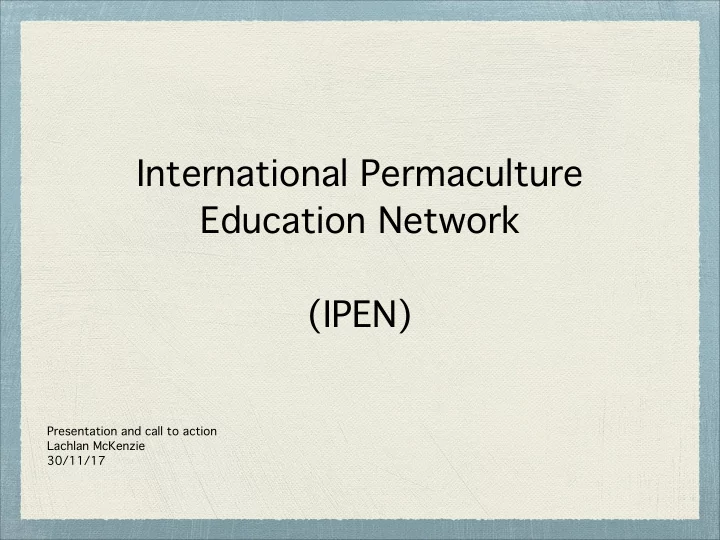

International Permaculture Education Network (IPEN) Presentation and call to action Lachlan McKenzie 30/11/17
Origins IPEN started at the last IPC, in London 2015, as part of the Next Big Step initiative.
Why IPEN? It is a mechanism or network for enabling coherent education evolution, expansion - good for teachers and students.
Our situation Permaculture trainings and education has been going incredibly well considering the limitations and challenges. But has now got to a stage where many feel it is ready for further evolution. Time is fast running out for social and cultural evolutions needed to prevent climate change, protect our environment and our healthy society. There is huge appetite for change but not enough knowledge out there of how to do it.
Global to regional to local benefits How does global work actually benefit people on the ground?
Local to regional to global How do I work locally but still feedback into global systems?
What IPEN isn’t… Permaculture will always grow organically, IPEN aims to feed the organic growth. It isn’t a regulator, a representative body or a creator of standards.
Permaculture is like mycelium From small beginnings mycelium grows and grows until there is enough energy to produce fruit - mushrooms
IPEN aims to feed and grow the mycelium networks Mycelium interact with tree roots, creating symbiotic relationships As a vital component of whole ecosystems, mycelium is a connector, a transmitter an absorber, a transformer and a feeder.
Group activity Break into groups of 2 - 4 and discuss what is most needed to improve permaculture education in your area.
IPEN structure Advisory panel • Guidance, project advice and approval, working in groups as well • Our aim is 1 female and 1 male from each continent on a 2 -3 year rotation Working groups and projects • As needed, as created, as inspired Secretariat • To enable smooth functioning of the IPEN process
So far.. Already 70 people from our survey and from different international networks are keen to be involved. We have some seed funding to help establish the IPEN structures and for seeding a few I-LAND education sites.
Our Global Survey • Derived from two similar versions, the survey represents the views of 115 experienced permaculture educators from around the world. • Responses feed into initial working groups and projects • The survey itself is a valuable tool for IPEN members to use for their own projects, project proposals, reports etc • The answers asking for written responses have provided us with a rich body of information about the on-the-ground situations for educators across the globe.
Responses… Measuring effectiveness Increasing effectiveness
Core curricula in development
Course format and content Learning resources Teacher training
Course follow up support systems
IPEN working groups (some, so far…) • iLANDS • Training of Trainers • More and varied courses • Educators guilds • Resources • Curricula • Wiki style interactive website Lets discuss!
For more information on IPEN visit: https://www.permaculture.org.uk/ about/international
Recommend
More recommend